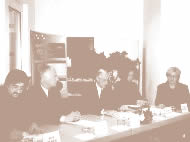
2. Linguistic or non-linguistic objectives?
Linguistic objectives and learner autonomy
First of all, the work of input into the forum (posting contributions, reading contributions, reacting to contributions) gives the learner the advantage of a kind of linguistic immersion which supplements or even replaces another medium (textbook, lesson requiring attendance in person, etc.).
Furthermore, the learner can also make new use of the grammatical, lexical and communication skills which he acquired at an earlier learning stage.
This work mainly develops linguistic skills in written comprehension and written production in the framework of the forum itself, since the exchanges take place in writing (reading and drafting messages). In practice, however, all the skills emerge. Learners communicate with each other – within the same class or the same group- using oral skills (oral comprehension and expression).
Practice in reading in a foreign language on the same subject or topic, apart from using acquired skills, familiarises the learner with new structures which he will be led to master and use in turn.
Moreover, the pupil’s understanding of message content and his interest in specific topics will enable him to search for new language resources in order to communicate more and in greater depth with his correspondents.
This “natural” learning process will advance the pupil not only in linguistic skills proper but also in establishing linguistic strategies. The necessary individual work will be supplemented and enriched by a collective approach on a pair basis or in a larger group. This set of actions will bear fruit by moving on from a teacher-directed approach to a well managed individual, autonomous one which will take the pupil on to a new stage, to the pleasure of learning on one’s own.
The teachers who took part in our project had recourse to several types of work. Some incorporated all the activities into their lessons, others left more scope for work at home. Obviously, the choice depended heavily on the participants’ technical equipment. Pupils who had direct access to a computer outside the classroom were much more involved in the work. These same pupils often helped their classmates who were not sufficiently good on the computer or who were discouraged.
Some colleagues worked alone, or with colleagues teaching other languages or computer studies.
As regards the organisation of work, we found working in pairs just as often as working in groups of several pupils.